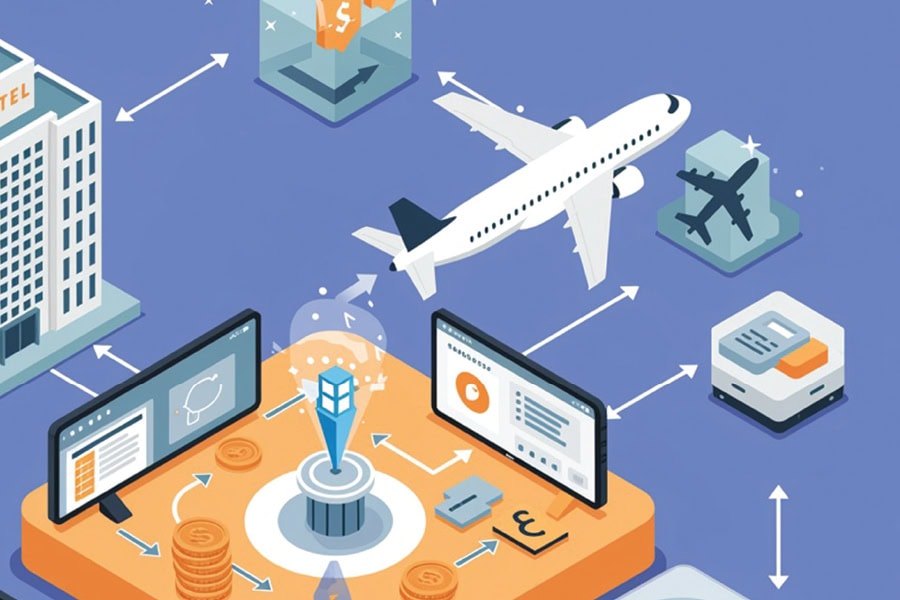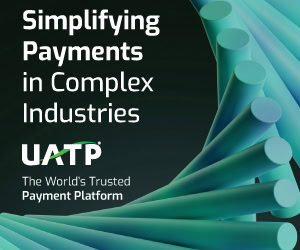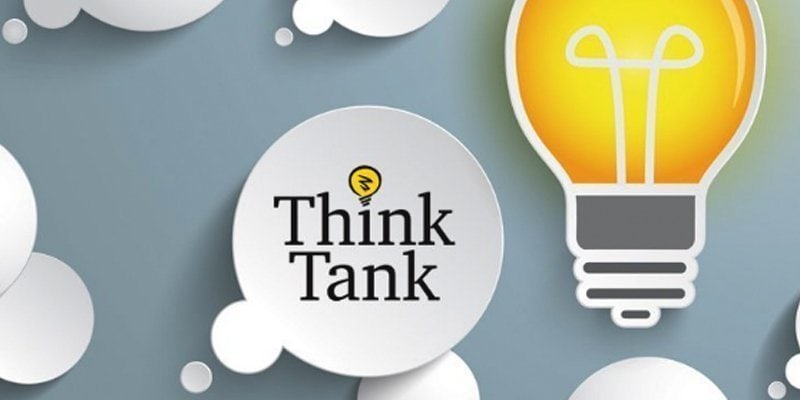Unified. Intelligent. Predictive. Technology that’s transforming corporate travel
After years of piecemeal innovation and siloed systems, the corporate travel industry is nearing a long-anticipated transformation: a unified platform that combines booking, payment, and expense management in one seamless experience. Driven by traveler expectations and corporate demands for greater efficiency, this all-in-one model could redefine how business trips are shopped, purchased and reconciled across multiple channels.
“There’s a growing demand for end-to-end visibility and control,” says Wendy Ward, chief marketing officer at UATP. “Corporates are seeking real-time insights into travel spend to better manage budgets, improve forecasting, and strengthen leverage in supplier negotiations.”
That demand isn’t just operational; it is emotional as well. Business travelers increasingly expect the same intuitive and frictionless experiences they enjoy as consumers. “This has been a major driver of digitization across the industry – particularly in booking processes and the expansion of flexible payment options,” Ward adds.
At the heart of this shift is integration. Connecting travel platforms directly with ERP and expense management systems has become a top priority for both travelers and travel managers. “For travelers, it’s about ease of use; for travel managers, it’s about streamlined reconciliation and accurate reporting,” Ward explains. “This integration enables real-time visibility into both individual and company-wide travel spend, enhancing financial oversight.”
Travel managers want a full picture of what’s happening in their programs, including how and where money is spent. All-in-one systems that integrate travel, expense and payments make it easier to track costs, spot trends, make decisions and manage budgets more effectively, notes Chris Juneau, SVP, head of product marketing at SAP Concur. They also drive operational efficiency.
“The value of these tools only grows when you layer in AI,” Juneau says. “By bringing total spend data into one smart platform, companies get real-time insights into spending patterns, compliance risks, and cost-saving opportunities. “
When seeking approval for the purchase of new technology, one persistent obstacle that often comes up is demonstrating the return on investment. “But with integrated platforms, the benefits speak for themselves,” says Juneau. “For example, they make it easy to report time saved from streamlined administrative processes and improved compliance, and cost saved through automated policy enforcement and increased visibility into spend.”
The Power of Modern Payments Systems
New and innovative payment systems and methods are already helping smooth out the corporate travel expense and reimbursement process for travelers and businesses, and as these practices become more integrated into end-to-end solutions, they will provide even greater convenience and savings.
For example, virtual cards can make compliance easier since businesses can configure them with predefined spending rules, specifying fixed amounts or restricting their use only at certain approved merchant types, says Duke Chung, CEO and co-founder of TravelBank, which was acquired by U.S. Bank in 2021. “This reduces post-transaction audit requirements,” Chung explains. “What had been downstream work has now been shifted upfront and done automatically.”
Chung also cites benefits of new technology such as smart notifications, which can automatically alert a business traveler if a flight is delayed or has been changed, or provide them with helpful information. For example, alerting them that their corporate travel policy already covers car rental insurance, eliminating the need and stress for them to buy insurance as they arrive at a rental desk.
Ultimately, the goal of all this innovative technology is to create a better experience and enable self-service as much as possible, says Chung. “Business travelers want a delightful, consumer-grade experience,” he explains. “And companies want to enable as much automation as possible.”
Brett Dowling is vice president of GetThere, a business travel management solution that Serko acquired from Sabre as part of a partnership arrangement between the two companies completed earlier this year. Dowling also underscores the benefits of virtual cards to automate and streamline experiences by tying spend to specific suppliers, dates and amounts. “You can’t go off-policy when you’re boxed in by design,” Dowling says.
Furthermore, he adds that embedded payments within the booking flow are helping reduce channel leakage by eliminating the temptation for travelers to book outside approved systems. When paired with mobile wallets – which lower the psychological barrier to real-time tracking and approvals through simple swipe-or-tap functionality – these tools are streamlining compliance while improving the user experience.
All of this leads to a behavioral shift, says Dowling. “Travelers stop thinking about ‘expense reports’ and start thinking about ‘approved experiences.’ Fewer exceptions, less drama,” he says.
TMCs & The Future Ecosystem
All of these advancements in technology designed to streamline and simplify the experience for the entire business travel ecosystem may lead one to wonder what the future role of travel management companies will be. Some TMC’s are adapting, Dowling says, while some are not. “Forward-leaning players are opening APIs, investing in fintech partnerships, and experimenting with new business models,” he notes. “Others are trying to retrofit old workflows and UI onto a new world of dynamic payments and trip personalization. This won’t scale.”
Ward maintains that TMCs and OTAs aren’t going anywhere – they will remain essential to the corporate travel and payment ecosystem. “As the frontline interface, they play a critical role in managing data, enabling tech-driven agility, and supporting integrated payment solutions,” she says.
However, to stay competitive, Ward warns that traditional TMCs must accelerate their digital transformation – embracing real-time data feeds, integrated virtual card capabilities, and open API ecosystems. Without these advancements, they risk falling behind in an industry that’s quickly moving forward.
“Compared to just a few years ago, adoption of modern tools has improved, but further progress is needed,” she says. “The landscape is shifting rapidly, driven by tech-first players like Blockskye, Navan and TravelPerk – companies that are redefining travel management through data intelligence and platform innovation. These firms combine the core functionality of a TMC with the speed and flexibility of a fintech, setting a new standard.”
SAP Concur’s Juneau notes that booking tools are often seen as a commodity, and they remain central to how travel managers facilitate their corporate travel programs. However, there are ways the tools must adapt to meet the needs of this new ecosystem. “It’s important to us that we meet travelers where they are,” he says. “That means booking needs to be simple and consistent across mobile, websites or even direct channels. No matter how someone books, the system should capture detailed data so companies can track spending, ensure policy compliance, provide duty of care and negotiate better rates.”
Undoubtedly, technology has changed the business travel process for all parties involved and helped drive efficiencies and better experiences. But business travel will never be 100 percent automated by technology and there will always be a need for the human touch, says Heather Wright, vice president, Global Product Marketing at BCD Travel. “I don’t think the people side of things is talked about enough,” says Wright, adding that human advisors that work either in-house at a TMC or at home remotely in different countries are a vital part of the business travel ecosystem.
Indeed, having “boots on the ground” in different countries can be comforting to travelers if they face an unexpected scenario such as a natural disaster, act of terrorism or even simply losing their passport. Of humans and technology, she concludes, “You can’t have one without the other.”
What Does the Future Hold?
Given all the advancements in technology and all the talk of a complete end-to-end unified experience, what does the ‘ideal’ future-state corporate travel payment ecosystem look like – and how close are we to realizing it?
According to Wright, the future is now. “We are already seeing all these new, innovative technologies being used out there on a day-to-day basis,” she says. “The new entrants that were disruptors a few years ago are now partners” to many TMCs. However, with lots of chatter around AI and other evolving technologies it’s important to know “what’s real and what’s hype,” she adds.
One example of what’s “real” and not hype is using AI-based reconciliation to automatically match and verify travel transactions – such as flights, hotel stays or meals – with corresponding booking records and expense reports. Technology should be about “creating a simple, seamless experience,” Wright explains. “Not only for the business traveler, but on the travel buyer side as well, giving the financial folks the same experience. It’s about automating the simple tasks so people can focus on the high-value tasks.”
Chung believes that the future state is one in which the entire travel experience is embedded in an all-in-one platform for all parties involved. “No more picking point solutions and having to integrate them,” he says. “It’s where everyone is using an all-in-one platform. It has become table stakes.” This means removing any need for manual reconciliations and audits, and finance teams “have real-time insights into everything that is happening,” he says.
It also means more personalized experiences for travelers. “Technology and advancements in AI give you the ability to bring together a lot more data, and data plays an instrumental role in shaping personalized experiences,” says Chung. “When you can mine and parse large sets of data you have the ability to create automated, personalized flows for each traveler.”
Indeed, AI thrives on structured, connected data, according to Dowling, and “as finance gets better data, travel managers have booking experiences optimized for desired business outcomes, and travelers never fill out another expense report.” While the technology exists today to achieve this ideal state, Dowling cautions that stumbling blocks remain, including adoption, integration complexity and industry inertia.
The industry should fully embrace emerging technologies, such as blockchain, AI, and true interoperability, Ward advises, while prioritizing a seamless, traveler-first user experience and supporting a broad range of preferred payment methods. “Achieving this requires full API connectivity across the ecosystem: booking tools, ERPs, expense platforms, airlines, hotels, rail providers, and more,” she adds. “It’s about creating a unified system where data, policy, and payment are seamlessly integrated. AI will play a pivotal role, not only in boosting efficiency but also in enabling predictive analytics and smarter decision-making.”
Furthermore, Ward states that tech-forward TMCs are already proving this model at scale with their enterprise clients. “We’re seeing increased collaboration between fintechs, TMCs and corporates, accelerating momentum,” she says. “But full realization is still a few years away. Ultimately, the future ecosystem must be interoperable, intelligent and predictive.”










